-
CARCEL: THE ETHICAL BRAND THAT EMPLOYS PRISONERS
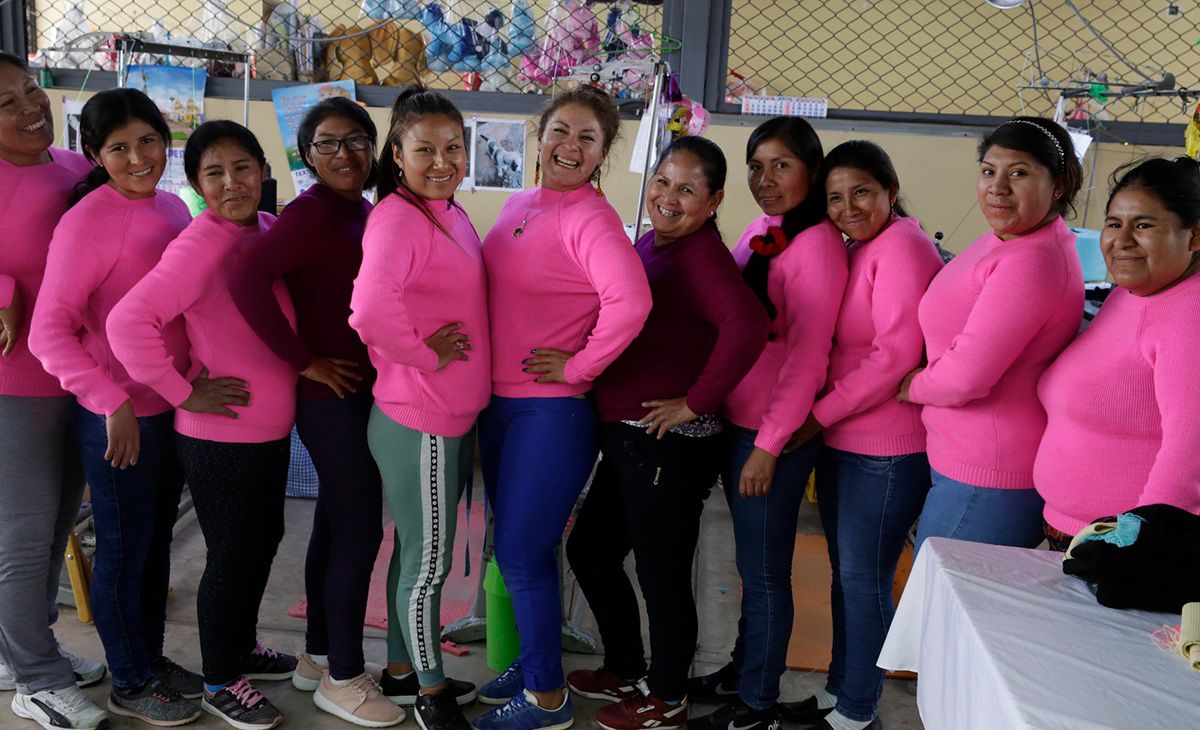
Printemps.com: Before launching Carcel with your co-founder Louise Van Hauen, you worked on another entrepreneurial project relating to menstrual cups. How did you move from that field into fashion?
Veronica D'Souza: I think it all really began when I was 20. I was dreaming of a better and more ideal world, and I was passionate about the idea of finding solutions for the future. In 2010, I went to Columbia University in New York to study environmentally-friendly commercial strategy. A year later, I launched my first business, Ruby Cup, aimed to make personal hygiene products accessible to disadvantaged women. I always wanted to start a business; fashion was simply added into the equation while I was staying in Kenya developing the Ruby Cup.
When I arrived in Nairobi, I spent most of my time in shanty towns. I went there to meet the communities of women who lived there and find out how to make a menstrual cup that was more easily accessible. I had to find the right market positioning to build good communication. Through this work, I discovered the terrible situations that the young girls there were in, and became aware of the impact that we could have on their lives. During a meeting, I looked at cases of women in prison. I discovered that the main reason for incarceration was poverty, which had led them to commit non-violent crimes, such as drug trafficking, theft and prostitution. What also struck me was that they had a lot of time on their hands but almost nothing to do. Many of them did crocheting or sewing, but just for their personal enjoyment. They didn't have access to good materials or good training, and couldn't sell what they had made. In addition, they didn't have the means to send money to their children. But I could see their potential and their craftsmanship. I was convinced that this context could lead to selling something appealing while linking the production to a beneficial social impact.
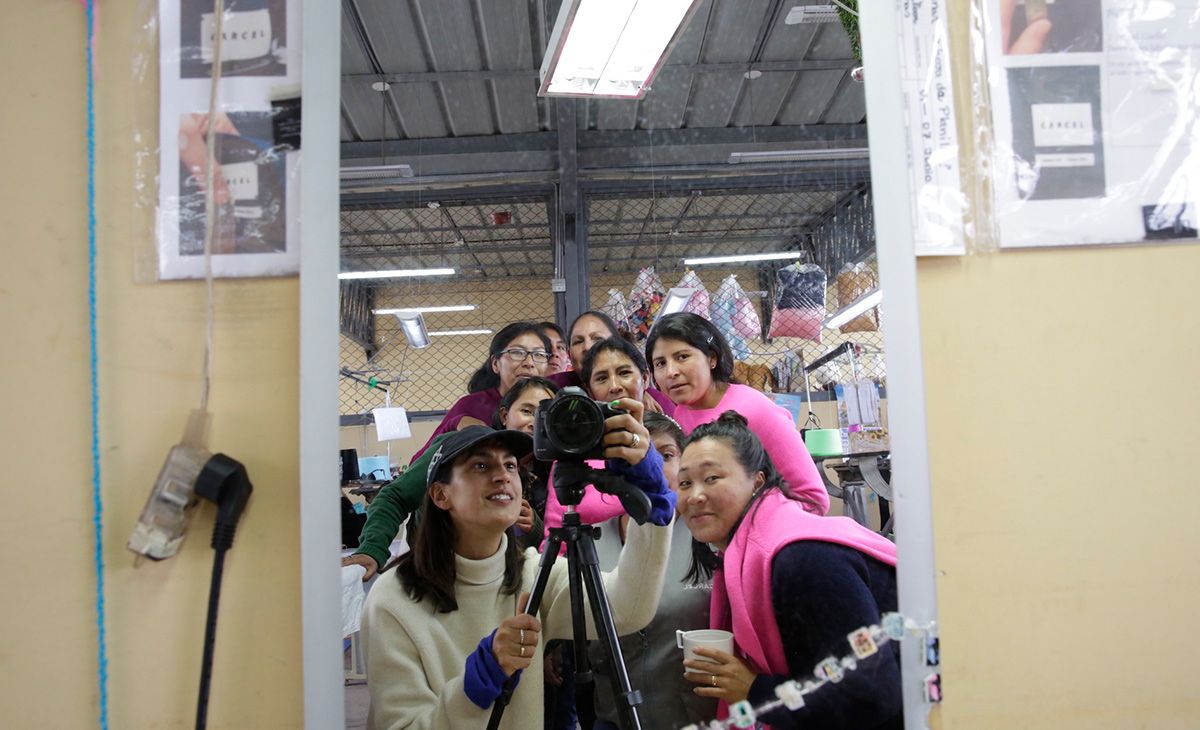
You now work with a Peruvian prison in Cusco. How did you choose it?
I drew a map of the world pinpointing the locations with the best fabrics and the highest rates of poverty-related crime among women. Peru came out on top. They produce alpaca wool: An eco-friendly material, which has a higher value than cashmere. It's important to note that in Peru, 70% of women are incarcerated because of cocaine trafficking. Very often, low-income individuals do not have access to good education. Women have the opportunity to get work simply because they're young or pregnant, and they are recruited as mules. But Peruvian women are also the most talented knitters in the world. It's part of their culture. As you travel through the country, you'll see women knitting at every corner—they practically do it from birth. I launched a crowd funding campaign, and in 12 hours we had the investments needed to launch the project in Peru. That's how Carcel was born.
I then found the phone number for the President of the national prison system on Google. I contacted him and he replied: "Come, and call me when you're on site." So I jumped on a plane, and he explained that the reoffending rate tended to decrease when women had an occupational activity during their incarceration. He gave us access to all the prisons in the country for a month, and the one in Cusco caught my attention. It's small and situated in the countryside, right where the alpacas are raised. The other advantage was that the women had already learnt to use knitting machines. As a Scandinavian brand, we strive for a very refined DNA. No need for elaborate knitting techniques; Carcel makes it simple, beautiful, and durable.
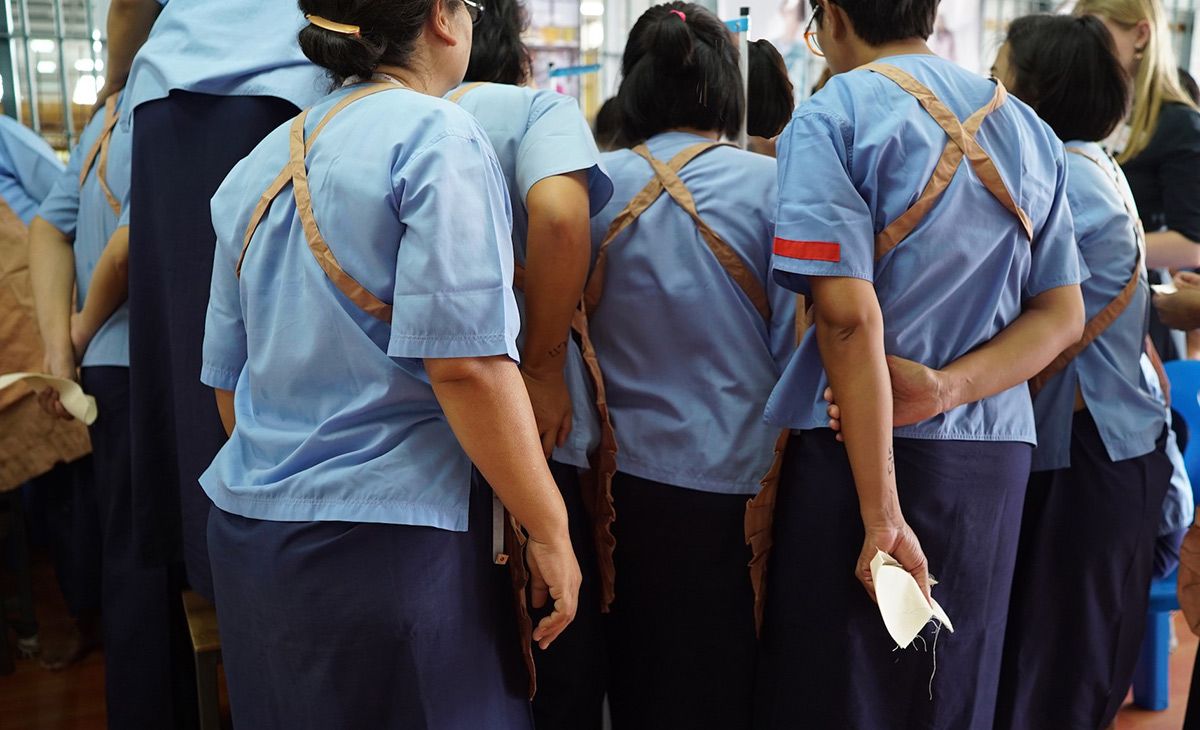
More recently, you began to work with detained women in a prison in Thailand. Why did you develop a production site in this country?
Thailand has a long history of silk, and in addition to their knowledge of silk manufacturing techniques, Thai women are very gifted in embroidery—so it was an opportunity to delve into our love of detailing. In addition, it is the country with the highest number of prisoners. I contacted the national prison system, as well as the Princess of Thailand, who also happens to be an ambassador for female inmates. A year ago, we launched our collaboration with Chiang Mai prisoners to develop a silk collection.
We now plan to open a new workshop outside of the prisons, because it's very hard to get a job once you have been released. For some of the older inmates, they have been inside for 20 years, and they don't know or understand today's society.
"Adding the name of the seamstress is a way to give them back their identity, when society has completely excluded them."
When a seamstress makes a piece, she sews her name on the label inside the clothing. Why did you start this practice?
Adding the name of the seamstress is a way to give them back their identity, when society has completely excluded them. Also they're proud of what they have accomplished, and can receive a real acknowledgement thanks to this initiative; they are no longer viewed as prisoners but as skilled people. We are therefore creating the space to offer a little humanity, but we remain a company and they are our employees. We don't consider ourselves to be saviours in any way, just as they do not see themselves as victims. We think that's independence.
Also, by displaying the seamstress' name on the label, we hope to rebuild emotional ties between the clothing and its owner, which have increasingly frayed since the start of the modern era. We buy, then we throw away...
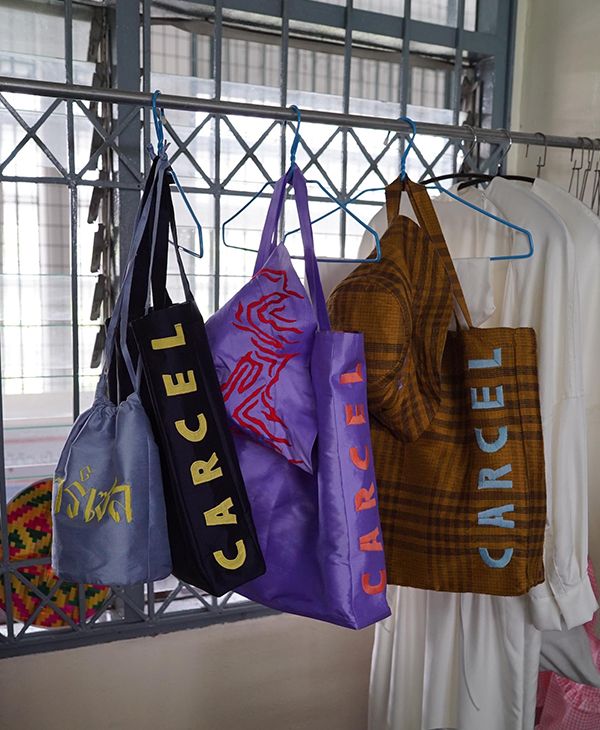
How do you pay the inmates that work for you? Do they have access to bank accounts?
At Chiang Mai, everything is very well organised. There are over 2,000 inmates and they have an internal banking system. In Peru, it's a little more complicated. They don't have account and have to pay for everything in cash, even their soap. We are thinking about setting up a safer and more secure structure, but it takes time. We want at all costs to avoid issues arising between the prisoners out of jealousy. For now everything is going great, but the system needs to be improved.
How much do you pay the prisoners that you work with?
We believe that a person employed inside of prison deserves the same rights as a person employed outside of prison, in terms of pay as well as general working conditions. To index the salary, we first look at the industry standards for similar work in the textiles sector, before finding out the different ways to calculate decent salaries using organisations such as Minimum Wages, Asia Floor Wages, the Fair Indicator Foundation or the International Textile, Garment and Leather Workers' Federation. We then adjust this standard salary [resulting in an amount higher than the national minimum wage] on a pro-rata basis, as our teams don't work full-time but approximately 30 hours a week. In Peru, we issue bonuses that we add every month in addition to their fixed salary, based on the production of the employees working with the most modern machines. This helps to reward skill progression. In Thailand, they always get the same salary.
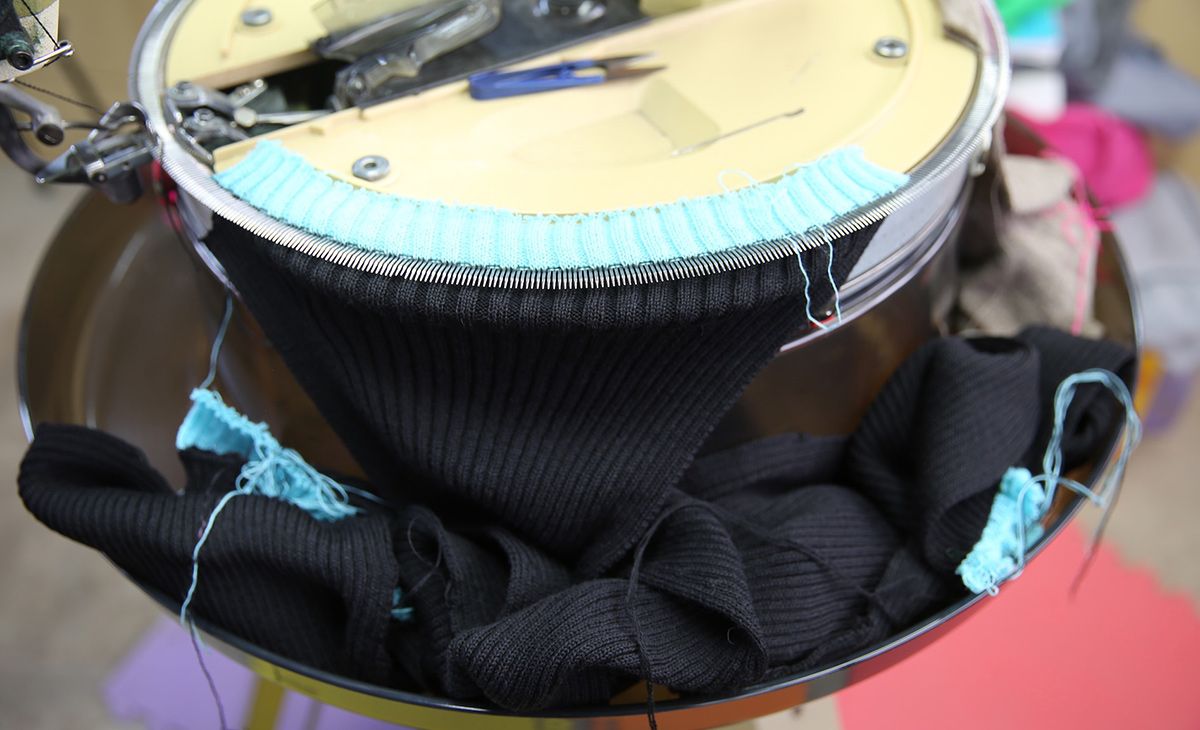
Alongside your social action with incarcerated women, you have also led environmental initiatives with your brand. What have been the main environmental issues that you have faced, and how have you gone on to resolve them?
The fashion industry is one of the most polluting on our planet and I think that the main causes are overproduction and over-consumption. To address these problems, the fashion industry must reduce waste; therefore I have analysed my entire production chain so that we can clean it up as much as possible. Carcel does not produce seasonal collections. I refuse to approach fashion like milk with an expiry date. And we don't hold sales. If it's good quality, a product has no reason to lose value. Having our own workshops also allows us to only design what we sell. Our production runs are small and we sell them until the final piece is sold out, so nothing goes to waste. We have also set up pre-orders for certain items, in order to anticipate customer demand.
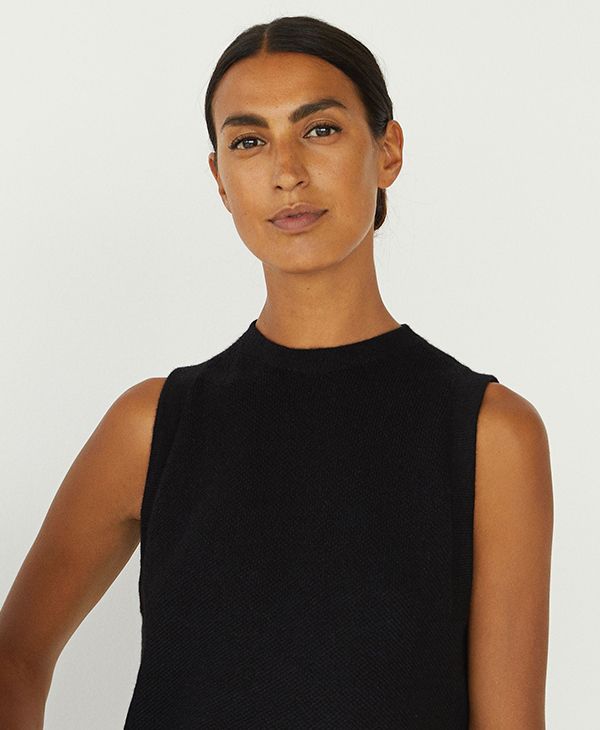
Veronica D'Souza
What's the biggest challenge that you have to face with Carcel?
The hardest thing is that we can't do more. I would love to be able to ensure a peaceful future for the prisoners that we employ, and to get them out of prison. We are also thinking of the ways in which we can speed up the pace, to be able to involve more women. At the moment, there are around 27 in total and there are not many opportunities, but we hope to be able to double our workforce next year.
Have any of your employees been released yet? If so, have you stayed in contact with them?
Our first employee is now out of prison and is working with us. Her name is Teofila and she oversees quality control for the clothes and helps our managers with production in Peru. She also wants to start her own events planning business, so she's currently training in entrepreneurial skills.